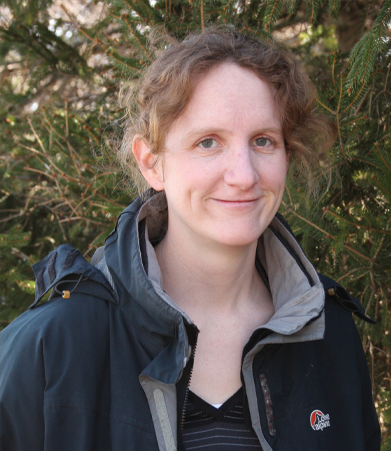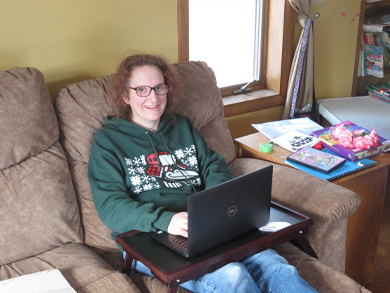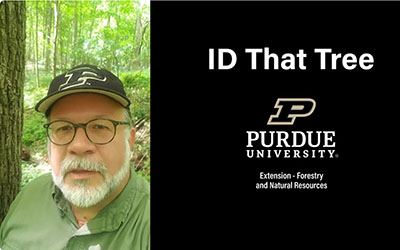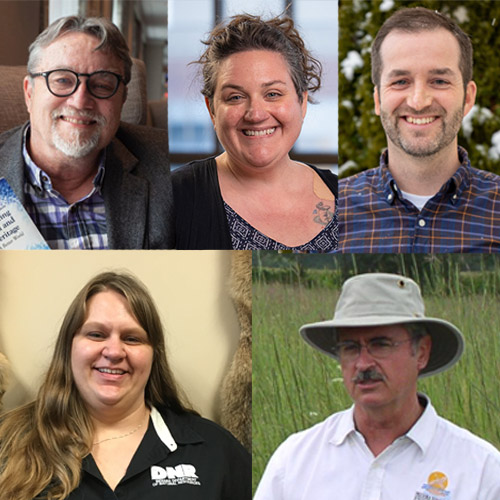Foley Tabbed as Unsung Diversity Hero by College of Agriculture
For her efforts in championing diversity efforts within Purdue Forestry and Natural Resources, Illinois-Indiana Sea Grant and the broader Purdue and Indiana communities, Carolyn Foley, research coordinator for the Illinois-Indiana Sea Grant College Program, has been named as the recipient of the 2021 Purdue College of Agriculture Unsung Diversity Hero Award.
 The "Unsung" Diversity Hero award was established by the Purdue College of Agriculture to acknowledge individuals who work tirelessly to make a difference in the lives of others and to foster an environment or respect and optimism. The award recognizes faculty, staff, and students who have positively influenced a program, department, or organization from behind the scenes with a positive attitude, a willingness to help in whatever capacity necessary, and a commitment to excellence.
The "Unsung" Diversity Hero award was established by the Purdue College of Agriculture to acknowledge individuals who work tirelessly to make a difference in the lives of others and to foster an environment or respect and optimism. The award recognizes faculty, staff, and students who have positively influenced a program, department, or organization from behind the scenes with a positive attitude, a willingness to help in whatever capacity necessary, and a commitment to excellence.
In the summer of 2020, Foley played an important role in initiating, organizing, and facilitating a summer staff and graduate student reading group on topics of diversity, equity and inclusion. She actively participated in reading group discussions throughout the summer and her involvement and leadership was clearly noted by many who participated in the group. In the fall of 2020, when the summer reading group concluded, Foley invested her time and energy to translate the lessons learned and needs identified by the summer reading group into action, resulting in a list of priority action items that will guide future departmental efforts on diversity, equity, and inclusion.
To ensure that the momentum built in the summer of 2020 by the reading group did not fade, through her leadership, Foley was directly responsible for the establishment of the FNR Justice, Equity, Diversity and Inclusion (JEDI) Council. The FNR JEDI Council was established to promote justice, equity, diversity and inclusion within FNR by: (1) Making recommendations to the FNR faculty, staff, and leadership for proposed changes to policies, internal activities (e.g., events) and external actions (e.g., student recruitment) and (2) Helping FNR faculty, staff, and students build a community that supports a more just, equitable, diverse, and inclusive environment both while they are members of FNR and as they continue on in their careers.
Foley not only rallied FNR faculty and staff to form the JEDI Council, but pushed for it be led by faculty members so the group would have a better chance at making change. Foley is an active member of the JEDI Council, contributing to each meeting, discussion, and action, but without being recognized as a chair or co-chair of the Council.
“This is precisely what the unsung diversity hero award is about —recognizing people like Carolyn whose substantive, yet unrecognized, contributions are essential to the sustained success of diversity efforts,” JEDI Council co-chairs Dr. Brady Hardiman and Dr. Zhou Ma said in their nomination letter. “Carolyn’s significant contributions have catalyzed the implementation of JEDI values in FNR, IISG, and the throughout the broader Purdue and Indiana-Illinois coastal communities. Yet, she never takes full credit of the effort and achievement she has made. In fact, we had to ask her twice before she reluctantly agreed to be nominated for this award! In accepting the nomination, she humbly insisted on acknowledging her FNR and IISG colleagues and the graduate students who she works with on particular diversity and inclusion issues. This is just another example of how Carolyn is truly an Unsung Diversity Hero.”
 As the research coordinator for IISG, Foley is the primary contact for questions related to Sea Grant proposals and also helps plan and execute research and outreach activities on the Purdue campus. As part of her responsibilities, Foley co-organizes a monthly Teach Me About the Great Lakes podcast, which invites guests (researchers, practitioners, and policy makers) to share their work related to the Great Lakes as part of IISG’s engagement and outreach efforts. Foley has been working with Stuart Carlton, Hope Charters, and Megan Gunn to increase the diversity of guests interviewed for the podcast because she deeply believes the importance of role models and representation. Similarly, she has always made it her priority to nominate diverse speakers for the weekly FNR seminar series and to bring them to campus so FNR students can directly engage with outstanding BIPOC scholars and practitioners as role models.
As the research coordinator for IISG, Foley is the primary contact for questions related to Sea Grant proposals and also helps plan and execute research and outreach activities on the Purdue campus. As part of her responsibilities, Foley co-organizes a monthly Teach Me About the Great Lakes podcast, which invites guests (researchers, practitioners, and policy makers) to share their work related to the Great Lakes as part of IISG’s engagement and outreach efforts. Foley has been working with Stuart Carlton, Hope Charters, and Megan Gunn to increase the diversity of guests interviewed for the podcast because she deeply believes the importance of role models and representation. Similarly, she has always made it her priority to nominate diverse speakers for the weekly FNR seminar series and to bring them to campus so FNR students can directly engage with outstanding BIPOC scholars and practitioners as role models.
In particular, Foley seeks to bring together panels that not only provide important insights and meaningful conversations to Purdue students, but also to incorporate diverse perspectives. Examples include when Foley brought a diverse set of employees from the National Oceanic and Atmospheric Administration (NOAA) to campus in the fall of 2019 to help FNR students identify potential careers outside of academia, and when she organized a panel presentation and discussion with speakers from the Hawai’i Sea Grant program in early 2021 to highlight and demonstrate the importance of Indigenous knowledge in natural resource management.
In her role as the Chair of the National Sea Grant Research Coordinators Network, Foley has Helped assemble materials to help revise how research proposal review processes are conducted with an explicit goal of minimizing bias and supporting more diverse and inclusive research. She wrote the current requests for proposals (RFPs) issued by the IISG in such a way that encourages principal investigators (PIs) to work with underserved communities.
In addition to her contributions to diversity within Illinois-Indiana Sea Grant and with the FNR JEDI Council, Foley also has impacted Purdue FNR in other ways. In recognizing that outdoor safety is not a privilege enjoyed by all members of society and many FNR faculty, staff, and students conduct field work in and beyond Indiana, Foley has been instrumental in facilitating department-level discussions about field safety. Beyond these discussions, she has worked with the FNR Field Safety Committee to develop FNR-specific field safety guidance and secure financial support from department leadership to purchase labeled field equipment (e.g., magnets to go on field vehicles to clearly and visibly indicate Purdue affiliation as well as Purdue-branded vests students can wear during field work). These are items that have been recommended to increase field safety, particularly for BIPOC faculty, staff and students.
“I would like to acknowledge the efforts of my colleagues across the College of Agriculture and the National Sea Grant Network, who have helped me learn how to do better,” Foley said. “I am especially grateful to the graduate students and staff of FNR, whose thoughtful conversations and actions have been critical to advancing JEDI efforts. I also would like to thank the many BIPOC and LGBTQ+ naturalist, conservationist, and scholars who graciously share their experiences in academia and the outdoors.”
Foley has served with the Illinois-Indiana Sea-Grant Program since 2010 and also maintains an active research program with Purdue FNR’s Fish Ecology Lab under Dr. Tomas Hook. She has collaborated on research and outreach activities in the Great Lakes with researchers and other staff from the United States Geological Society’s Great Lakes Science Center, the United States Environmental Protection Agency’s Great Lakes National Program Office, the National Oceanic and Atmospheric Administration (NOAA) Great Lakes Environmental Research Lab, the Great Lakes Observing System, Illinois Natural History Survey, both Illinois and Indiana Department of Natural Resources Lake Michigan Coastal Programs, LimnoTech Inc., and many other academic institutions.
In 2020, Foley became chair of the National Sea Grant Research Coordinators Network.






